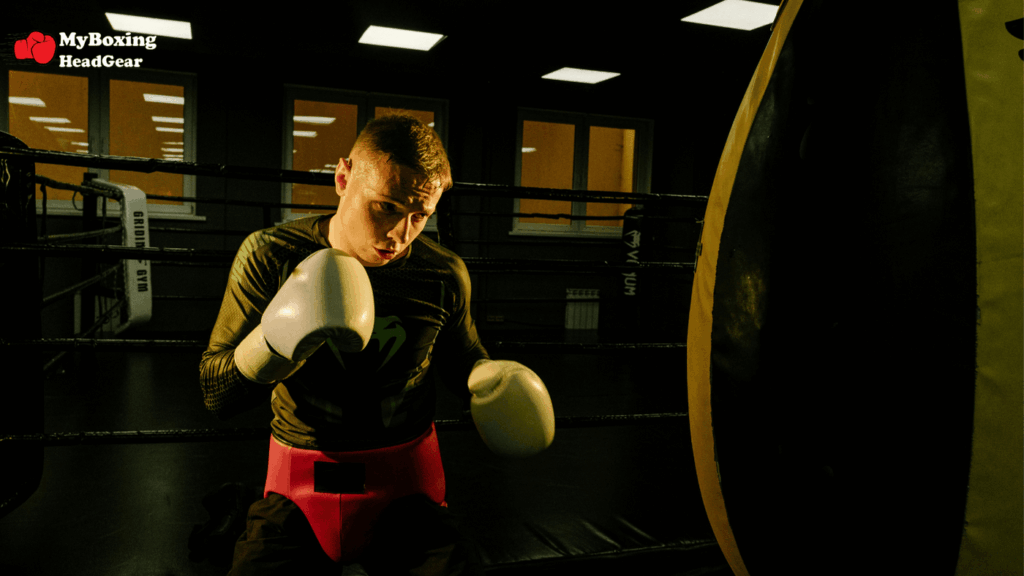A boxing mindset is about so much more than punches and footwork. It represents an internal framework of psychological discipline, resilience, and mental clarity. That fighter mentality is also developed in the gym, as it involves how a boxer deals with failure, pressure, and everyday life.
Boxing is essentially a mental sport. Mental toughness in boxing is much more than a competitive edge. It’s necessary for survival, growth, and excellence.
Understanding Mental Toughness in Boxing
Mental toughness in boxing isn’t just about staying cool under pressure—it’s about staying sharp, bouncing back from setbacks, and keeping your composure when everything’s on the line. In the ring, it means taking hard shots and still thinking clearly, sticking to your game plan even when your body is screaming out in pain. Traits such as grit, perseverance, confidence, and the ability to adapt are what distinguish real fighters from the rest.
Training camps are brutal. Boxers push their limits day after day, waking up sore and tired, only to do it all over again. Sparring tests more than just your chin—it tests your mindset. Getting hit, getting outworked, or even losing a round challenges your self-belief. But these moments shape a fighter more than any pep talk ever could.
The best boxers aren’t just physically gifted. They’re mentally relentless. It’s their mindset that carries them through the pain, the fatigue, and the chaos of a tough fight. That mental edge is what truly makes a fighter elite.
The Foundation of the Boxing Mentality
A boxer’s mindset begins with discipline. It’s about waking up early, following a routine, and showing up, regardless of whether motivation is present. You build success by repeating the right actions every day without compromise.
The boxers learn to delay gratification. No shortcuts. Those few minutes in the ring require months of sacrifice. The takers embrace the process and understand that mastery comes with sweat and repetition.
Self-accountability is essential. Fighters track their diet and performance, holding themselves to high standards because neglect is felt both physically and mentally in the ring.
Dealing with Pressure and Adversity
In the ring, pressure is constant. The ability to stay calm under fire—when a punch lands hard or a round isn’t going their way—is a hallmark of the boxing mindset.
Losses are inevitable. What separates fighters is their response. Some crumble, while others study their failures, adapt, and return stronger. Boxing teaches that setbacks are part of growth, not reasons to quit.
Pain and fatigue are daily experiences in a fighter’s world. The ability to perform under those conditions—to think, move, and defend while the body screams for rest—is developed through repeated exposure and psychological conditioning.
The Role of Emotional Control
The boxing ring is no place for uncontrolled emotion. Fighters must manage anger, avoid ego-driven decisions, and silence self-doubt. Emotional volatility can lead to strategic mistakes and physical danger.
Visualization plays a key role. Many fighters mentally rehearse every round, every movement. Breathing techniques help regulate nerves and maintain composure before and during competition.
Outside the ring, emotional intelligence strengthens relationships with coaches, teammates, and the broader community. A balanced emotional life supports long-term success and well-being.
Building Confidence Through Repetition
Confidence in boxing is not blind optimism. Through intense, consistent training, fighters build trust in their skills and conditioning. Every round completed, every pound shed and every technique refined adds to their self-belief.
Small victories matter. Sparring well, hitting a training target, or improving footwork—these incremental gains accumulate, slowly reshaping a fighter’s mental state. Physical preparation is inseparable from mental readiness. When fighters know they’ve done the work, their minds are calm, and confidence follows them into the ring.
The Power of Focus and Presence

A single concentration lapse can cost a fight. To stay present while reacting to the opposition’s rhythm, changing tactics, and doing the job cleanly is mentally tough.
Distractions include the crowd, the opponent’s antics, and even self-doubt. Fighters block out these external influences. Round by round, second by second, they learn to direct their attention precisely. So what we get is a mind programmed to perform under chaos, grounded in the present, with intention.
Mental Training Techniques Used by Boxers
Visualization is a staple in mental training. Fighters see themselves executing techniques, walking into the ring, and raising their hands in victory. This mental rehearsal conditions the brain to believe in success before it happens.
Positive self-talk is another pillar. Repeating affirmations like “I am prepared,” “I am focused,” or “I will adapt” reprogram inner dialogue, especially in moments of doubt or fatigue.
Goal tracking keeps boxers grounded. They set daily, weekly, and long-term goals, reviewing progress regularly. Post-fight performance reviews, guided by coaches, offer insights into both physical execution and mental decision-making.
Lessons Beyond the Ring
The boxing mentality is a mindset that serves athletes in every area of life. Resilience, discipline, emotional control, and focus are universal traits of success.
Many fighters apply their mental toughness to business, coaching, or community leadership. They thrive under pressure, adapt to changing circumstances, and persist in the face of rejection or failure.
Stories abound of boxers overcoming poverty, violence, and personal struggles by leaning on their mental strength. The ring may be where it’s forged, but the mindset stays with them forever.
Frequently Asked Questions
What is the boxing mindset?
The boxing mindset is a mental framework rooted in discipline, resilience, focus, and emotional control. It’s the psychological strength that enables fighters to endure pressure, train relentlessly, and perform under stress.
What mental training techniques are used by boxers?
Boxers use visualization, positive affirmations, goal-setting, and performance review. These practices help reinforce confidence, maintain motivation, and prepare the mind for high-stakes competition.
Can the boxing mindset be applied outside of the ring?
Yes, the mindset of a fighter is highly transferable. Traits like grit, persistence, emotional intelligence, and goal-setting are valuable in careers, relationships, and overcoming personal challenges.




